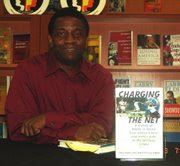If you inte nd to see Precious, a manipulative attempt to condemn society for generations of personal irresponsibility, don’t read this.
nd to see Precious, a manipulative attempt to condemn society for generations of personal irresponsibility, don’t read this.
The billboard reads: “Oprah Winfrey and Tyler Perry Present Precious, Based on the Novel Push by Sapphire.”
If the film is nominated for an Oscar, I wonder if the title will be read that way on awards night in March 2010.
What I also wonder is would Precious be considered racist were it directed not by Lee Daniels, an African-American, but by a white director, say, Quentin Tarantino?
We are supposed to believe Precious is different because Winfrey and Perry have placed their pop-culture imprimaturs upon it.
And because the film is based on a book written by a black woman.
Well, I don’t buy it.
In 1997, Tarantino directed Jackie Brown, a film adapted from a book by Elmore Leonard. Jackie Brown featured Pam Grier in her first major-studio starring role in nearly a quarter-century, since the days of Coffy and Foxy Brown.
A controversy arose because in Jackie Brown, some characters had a seemingly obsessive compulsion to say “nigger.”
Spike Lee even accused his fellow auteur of racism.
That’s how these characters talk, Tarantino replied.
That’s how a lot of black people talk, he added.
Lee and other blacks disagreed.
Apparently, only black artists should be allowed to degrade black life.
I have never subscribed to that notion.
That is why the sounds and imagery and blatant emotional manipulation in Precious annoy me as much as the slur-fest in Jackie Brown.
Precious includes a scene showing the morbidly obese title character stealing a bucket of fried chicken, and another scene in which Precious’s mother throws a baby to the floor.
Another scene depicts a knock-down, drag-out fight between Precious and her mom.
Another scene shows the incestuous rape that produced both of Precious’s children, and refers to her first delivery, which occurred at home while mom kicked Precious in the head.
In yet another scene, mom demands Precious please her sexually.
Somewhere, D.W. Griffith is smiling.
These Precious scenes are from a decade-old book adapted just in time for the administration of the first African-American president.
“We’ll teach you darkies not to get all proud and uppity.”
– The Man
There’s no doubt in my mind we would hear certain black ministers call for marches on studio corporate headquarters and Birth of a Nation-type boycotts outside theaters if
Precious had been directed by a white person.
While I don’t consider Precious a contemporary version of 1918’s Birth of a Nation, Precious contains enough racist imagery to hinder rather than enhance the storytelling.
We don’t need to see Precious running down the street with a stolen bucket of fried chicken to know that her parents do not value her.
We don’t need to see her mother throw her newborn grandson to the floor to know that this woman is severely damaged.
Precious needed not a hammer, but a more subtle approach to telling the story of poor, ignorant black folks in 1987 Harlem who do not value themselves, and one girl’s struggle to break that cycle.
Spike Lee made a similar error in his 2000 film, Bamboozled, in which the call for an end to the negative imagery of blacks on television was blunted by his heavy-handed approach.
Precious is an interesting story not well-told.
Would Tarantino have done a better job?
Who knows? But given his ear for dialogue, the melodrama might have been leavened with some much-needed humor.
Precious has a hopeful ending, not a happy one.
We hope Precious breaks the cycle of ignorance and poverty in her family, but we don’t know. The single teen mother of two is just beginning to understand the value of education.
Now I wonder, and worry about, what
If Precious does well at the box office and wins an Oscar, there are bound to be other adaptations of ghetto-themed literature.
Alas, your neighborhood bookstores are full of them.
Full of books plumbing the depths of African-American ignorance and immorality that if adapted for the big screen would make the “blaxploitation” era of the 1970s look like the Golden Age of Cinema.


No comments:
Post a Comment